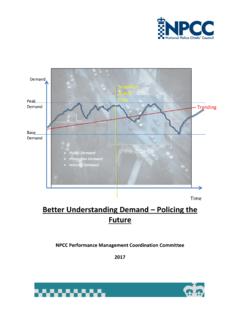Transcription of Outline Business Case - National Police Chiefs' Council
1 OFFICIAL TF OBC - PAGE 1 OF 129 31st March 2017 Outline Business Case 31st March 2017 OFFICIAL TF OBC - PAGE 2 OF 129 31st March 2017 T A B L E O F C O N T E N T S Introduction Page 3 Executive Summary Page 4 Strategic Case Introduction Page 7 Present Position Page 8 Options for transformation Page 12 Evaluating the options Page 14 Realising the benefits Page 16 Economic Case Introduction Page 19 Option Definition Page 17 Quantitative Assessment Page 36 Quantitative Assessment Page 59 Commercial Considerations Page 62 Summary Page 65 Financial Case Introduction Page 66 Summary Page 70 Commercial Case Introduction Page 71 Strategic Context Page 72 Business & Service Requirements Page 74 Category Management Page 79 Management Case Introduction Page 83 Delivering Option 5 Page 86 Appendix Appendix A Strategic Case Page 93 Appendix B Economic Case Page 93 Appendix C Financial Case Page 110 Appendix D Commercial Case Page 111 Appendix E Management Case Page 124 Acronyms Page 128 OFFICIAL TF OBC - PAGE 3 OF 129 31st March 2017 I N T R O D U C T I O N The Transforming Forensics project has been charged by the NPCC Forensics Portfolio Board with investigating the possible transformation of the delivery of forensic services
2 Using an evidence-based approach, by developing options and making recommendations that lead to a more effective, efficient and economic model, thereby delivering enhanced public safety and public confidence . The scope of the Transforming Forensics project was agreed from an early stage to include physical and digital forensics, but to exclude digital investigations and intelligence, and communications intelligence. The purpose of this Outline Business Case is to help identify a preferred option for transforming forensic service provision for Police forces in England and Wales, PSNI, BTP and NCA.
3 It sets out the rationale and goals for transformational change, explains the options available, and sets out a structured quantitative and qualitative evaluation, leading to the identification of a preferred option. The financial case supporting the preferred option is then outlined, together with an analysis of the commercial considerations that will need to be resolved. Finally, the Business case describes how the preferred option can be progressed. The conclusions reached in the Business case are supported by comprehensive data collection and analysis work covering forensic service provision in 23 forces.
4 It is important to note that the Outline Business Case is intended as the basis for making a decision. It is not a blueprint for the future service, and further appraisal of the selected option should be carried out in the subsequent Full Business Case. Also, the level of transformational change involved varies between options. Transformational change is expected to be an essential attribute in order to access financial support from the Police Reform and Transformation Fund (PRTF), and will therefore affect the overall affordability of each option. The OBC has been authored in accordance with the HM Treasury Green Book guidance1 and guidance on Public Sector Business Cases using the Five Case Model2.
5 1 2 OFFICIAL TF OBC - PAGE 4 OF 129 31st March 2017 This Business case proposes the delivery of a fully integrated forensic service that will better support policing and the wider Criminal Justice System (CJS), and adapt more readily to future needs whilst releasing resources for re-investment. THE NEED FOR CHANGE Patterns of crime are changing. Reductions in some crime types are being offset by new types of crime and crimes committed in new ways, especially with the increasing prevalence of digital technologies. Some crimes, such as fraud and child sexual exploitation, increasingly occur across multiple force borders, further complicating the traditional forensic picture.
6 As a result, while the use of traditional forensics is declining, demand for digital forensic support continues to grow exponentially. Meeting forensic needs is therefore difficult and will grow more so. Many forces already collaborate to improve services and realise savings, and most are also pursuing programmes to develop and deploy improved digital forensics capabilities. Although collaborative approaches deliver substantial benefits, they cannot address all new demands and still deliver the cost savings that forces need to achieve. The challenge facing Chief Officers and Police and Crime Commissioners (PCCs) is how to reform forensic service delivery in a way that significantly enhances the support provided to individual forces while establishing a strong platform to meet future needs and also freeing resources.
7 This echoes the challenge posed to PCCs by the Home Secretary in May 2016. The resulting vision set by the NPCC for forensic services is therefore to deliver high quality, specialist forensic capabilities that support the 2025 policing vision to rapidly protect communities and the vulnerable, and which are sustainable to meet future threats and demand. Forensic service delivery cannot meet this goal by continuing on its current trajectory. Instead, there is a need for transformational change. SERVICE TRANSFORMATION The project team has explored options for future forensic service delivery. These range from making the minimum changes necessitated by the updated biometric matching systems currently being developed, to comprehensive service transformation involving new ways of working and the consolidation of capabilities to deliver a fully integrated service to forces.
8 The analysis completed for this Business case has determined that the consolidation of forensic activities to establish a unified service supporting local delivery represents the most compelling option. This recommendation has been developed through detailed service modelling and cost/benefit evaluation, completed with input from forensic leaders in policing and specialist support from the Home Office. This conclusion is supported by qualitative assessments completed by forensic leaders across policing , and by independent analysis of the financial and commercial implications of each option.
9 The recommended future model will build on current strengths in delivering high quality forensic services to establish a single, National , unified service for the direction and delivery of forensic Executive Summary OFFICIAL TF OBC - PAGE 5 OF 129 31st March 2017 activities. This will simplify governance arrangements and introduce aggregated capabilities operating in a consistent way to appropriate quality standards. Overall direction, market engagement and ways of working will be set at National level, with aggregated back-end processing activities supported by a common logistics network.
10 By managing and delivering services at appropriate levels, from National to local, the service will provide local flexibility and responsiveness. The envisaged forensic service would also have influence across the whole forensic supply chain, including locally-based scene investigation services, and would influence research and development as well as the commercial and partnership approaches taken to procure service and supplies. The scope of the proposed forensic service would include all physical and digital forensics, but exclude digital investigations and intelligence, and communications intelligence.













